Ethiopia: UNHCR able to visit Fugnido camp again
This is a summary of what was said by UNHCR spokesperson Kris Janowski – to whom quoted text may be attributed – at today's press briefing at the Palais des Nations in Geneva.
Improved security has enabled UNHCR to visit Ethiopia's remote Fugnido camp for Sudanese refugees which was rocked by violent ethnic clashes last November. The ethnic conflict, between the Anuak refugees and the Nuer and Dinka communities, left 42, mainly Dinka, refugees dead and scores wounded. Following the November clashes, aid workers were not permitted to go to the volatile Fugnido camp for security reasons.
Staff who visited Fugnido for the first time in weeks described it as still tense. A number of refugees, mainly from minority ethnic groups who were particularly affected by the clashes in November, were found living in desperate conditions. They lacked basic supplies and had no shelter from the severe, hot and dry weather at this time of year. The visiting team immediately distributed plastic sheeting for shelter, jerry cans, blankets and basic kitchen utensils to the affected group.
On December 28, a total of 531 refugees were moved from the beleaguered site to Bonga refugee camp aboard eight buses organised by UNHCR and ARRA, the Ethiopian government department which oversees refugee matters. Bonga, home to nearly 17,000 Sudanese refugees of the Uduk community, is 160 km north-east of Fugnido. Among the refugees relocated to Bonga is a group of nearly 200 who fled into a compound which houses UNHCR and ARRA staff in Fugnido in the wake of the vicious fighting which erupted in the camp over control of a minority committee. They are mainly Shuluks, Nubas and Equatorians, a minority group in the camp who have been anxious about their safety and had asked to be moved elsewhere.
Fugnido is home to more than 28,700 refugees and is the largest of five refugee settlements in south-western Ethiopia's Gambella Region, where a total of 85,000 Sudanese are sheltered. The camp was first opened in 1988 but closed in 1991 in the aftermath of civil war which broke out in Ethiopia.
Related news and stories
Thousands of newly arrived Somali refugees in Ethiopia relocated to new settlement
Samira's Story
Drought brings life-threatening food shortages for refugees in Ethiopia
Recurring floods in Sudan displace refugees and their host communities
100,000 new Somali refugees arrive in Ethiopia in the past month, UN and partners are calling for urgent funding
UNHCR teams and partners rush assistance to some 100,000 newly arrived Somali refugees in hard-to-reach area of Ethiopia
-
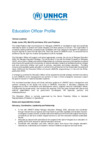
Education Officer
6 Oct 2026 -
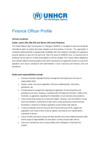
Finance Officer Profile
23 Jul 2026 -
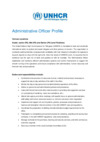
Administrative Officer Profile
23 Jul 2026 -
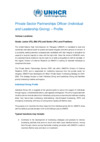
Private Sector Partnerships Officer (Individual and Leadership Giving)
28 Apr 2025 -
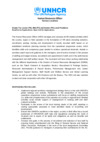
Human Resources Officer - Talent Pool Profile
12 Apr 2025 -
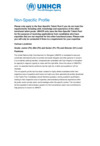
Non-Specific Profile
12 Apr 2025 -
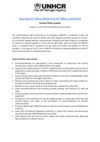
ICT Officer (Infra) Profile
Mar 2025 -
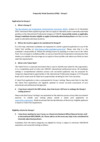
Group 2 Frequently Asked Questions (FAQ)
22 Jan 2025 The Recruitment and Assignments Administrative Instruction (RAAI), revised on 25 November 2019, introduced three applicant groups that can apply to internally and/or externally advertised positions in the International Professional category of UNHCR. -
Denmark
